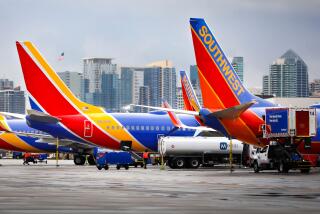Airlines Often Will React to Letters of Complaint
Does it pay to complain to an airline about poor service, or lack of it, or about any other misadventures?
In many cases, yes.
“We received many letters from passengers on the subject of waiving advance-purchase conditions on discount fares in emergency situations,” a United Airlines spokeswoman said.
“We had a general policy on this issue that allowed our local personnel, on a case-by-case basis, to waive these conditions and let people fly for less money. But the policy wasn’t always implemented the same way and on the same level of authority.”
As a result of consumer letters, United is deciding these hardship cases on an individual basis, but requests are automatically sent to a local supervisor for a decision.
For example, a Los Angeles man and his wife contacted a major U.S. carrier about his treatment at the Miami airport.
Scheduled to fly from Miami to Antigua, their flight was canceled. They were told there would be no more flights to Antigua from Miami that day on any airline, and to return the following day.
They discovered that another airline did have a flight from Miami to Antigua that same day, so they had themselves rerouted on it.
On returning to Los Angeles the man wrote to the airline of the original reservation. He received an apology for the behavior of the airline’s ground personnel and the official criticized his own ground people’s failure to make alternative flight arrangements.
The letter also indicated that the employees working that flight had been “counseled,” and would not make that mistake again.
In addition, the letter writer received two vouchers worth $250 for use on the airline’s domestic destinations.
Although not all the letters are expected to bring a comparable response, it is usually worth informing the airlines of questionable incidents. Even if you don’t get the response you would like, your letter may generate beneficial results for all passengers.
“We code each customer letter and track complaints on a weekly basis, looking for trends,” the United spokeswoman said.
Letters to United also have led to more personnel training in handling customer problems at point of contact, and have led to more authority given to first-line employees who have to resolve the complaints.
“We maintain statistics on complaints, which are relayed to pertinent department heads for possible action. Virtually all letters from passengers are carefully read and acknowledged. Some letters only describe an experience without asking for anything,” the TWA spokesman said.
Even if you don’t want a response, TWA still wants your letter. “Passengers who aren’t happy about something should write even if they don’t expect an answer or aren’t asking for some sort of action.
“We’d also like to hear about positive experiences,” the spokesman added.
When you do wish to complain, your letter should meet three basic conditions: Be clear as to what happened, detail what response you wish and document your charge.
But writers should be reasonable when seeking compensation, the TWA spokesman said. “For example, we get letters from passengers complaining about bad meals and wanting credit for another flight. These complaints may have validity, but a free trip is out of proportion to the situation. After all, the passenger still got the transportation, which is the basic value involved.”
Documentation should cover tickets, baggage receipts and itemization of expenses.
Generally, airline adjustments (you’ll need to establish a good case) might include monetary compensation or vouchers for other flights.
You can take your problems to the U.S. Department of Transportation, but first you should contact your carrier. If you’re unsatisfied with the response or don’t get one, then contact the department.
Areas of consumer protection covered by DOT rules are domestic baggage liability, overbooking/denied boarding compensation, seats in a nonsmoking area and charters.
Canceled, delayed or diverted flights represent a general area in which the department may not be able to provide assistance. Fares and flight services (or lack of them) are other categories in which the U.S. Department of Transportation may not be able to help.
However, fare advertising is another matter. If you think an ad is misleading or deceptive, let the DOT know.
Even though your complaint might be one the department can’t respond to, information is still used in the agency’s statistics on airline performance.
The U.S. Department of Transportation does ensure that an airline follows regulations. However, if there are no rules and the issue is a matter of airline policy, the passenger must pursue other steps, which can include litigation.
The department also won’t get involved in negotiations between passengers and airlines. While the agency might ask an airline what actions it had taken to find missing baggage (or to settle a claim about such luggage), it wouldn’t intervene in determining the value of the case’s contents.
Call the U.S. Department of Transportation at (202) 366-2220. If you phone after 2 p.m. or on weekends, you’ll hear a taped message that asks for your name and phone number.
Review your complaint before making a call to the DOT, and have documents handy. Be able to relay the problems precisely and clearly.
You can write (printed letters are preferred) to the Office of Consumer Affairs, U.S. Department of Transportation, 400 7th St. S.W., Washington, D.C. 20590.
More to Read
Inside the business of entertainment
The Wide Shot brings you news, analysis and insights on everything from streaming wars to production — and what it all means for the future.
You may occasionally receive promotional content from the Los Angeles Times.










